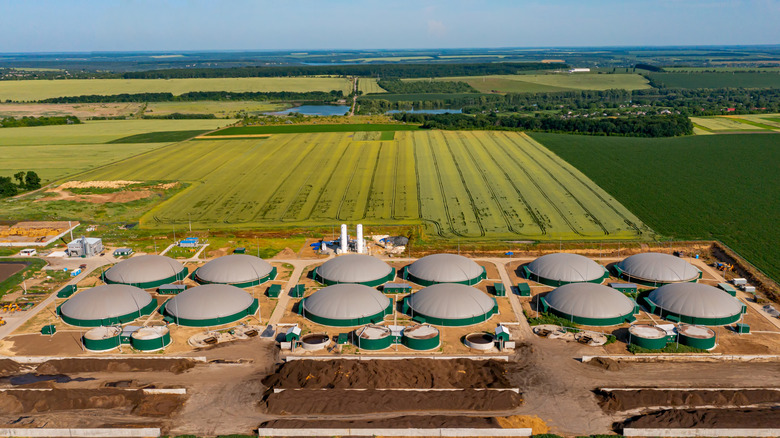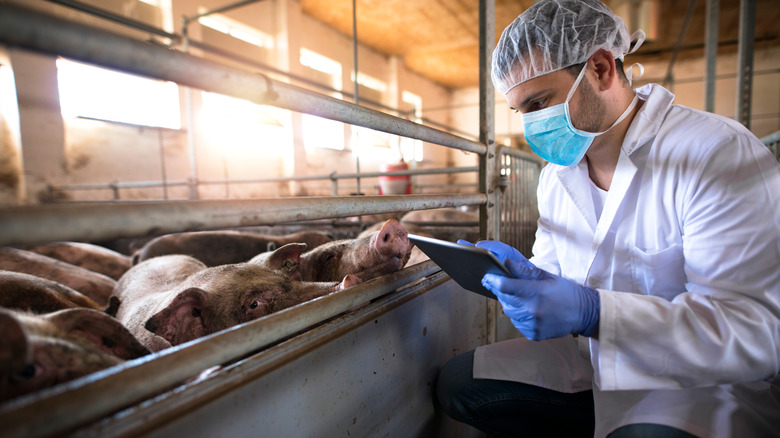Why Experts Say Biden's Policy For Eliminating Farm Animal Waste Has Serious Flaws
The American agricultural industry has long been one of the nation's largest producers of methane, a leading contributor to harmful greenhouse gas emissions that pose a major climate threat. In a recent report on the government's attempts to tackle this issue, the White House's Office of Domestic Climate Policy outlined a series of new initiatives aimed at lowering the nation's overall methane emissions — including those from animal farms.
However, some climate experts have raised doubts over the effectiveness of elements of the Biden administration's plans, particularly when it comes to solving the issue of enteric fermentation, the production of methane caused by the natural digestive process of livestock like cows, pigs, goats, and sheep. According to The Climate and Clean Air Coalition, this by-product of the agricultural industry may account for up to 30% of the total global methane emissions caused by humans worldwide.
In the U.S. alone, 12% of all agricultural greenhouse gas emissions comes from manure, The Guardian reports. Animal waste is also one of the main sources of pollution to U.S. waterways, which results in non-potable water that is dangerous to humans and wild animals alike. In the U.S. Methane Emissions Reduction Action Plan, the Department of Agriculture indicated that the current administration is taking numerous steps to reduce these manure-related emissions on a local and national scale (via White House Office of Domestic Climate Policy).
The government is working with farmers to convert waste into natural gas
In addition to launching the "climate-smart" incentivization program, which will reward farmers and ranchers for reducing their overall methane emissions, they also established an Interagency Biogas Opportunities Task Force, which will "facilitate the collection and use of methane for on-farm renewable energy applications” (via The White House).
The Environmental Protection Agency has also outlined a number of ways the government could reduce overall methane emissions across the agricultural and industrial industries, as well as in individual homes and businesses. One of these solutions, which addresses the manure issue head-on, recommends "altering manure management strategies" in order to reduce and capture methane, as well as making changes to how livestock is fed in order to reduce emissions from enteric fermentation (via The EPA).
According to The Guardian, one emissions-reducing tactic that has gained steam in recent years is a process called anaerobic digestion, which uses bacteria to break down manure (and other organic matter) in sealed, oxygen-free containers, resulting in a form of natural gas known as "biogas," which can be used to fuel farming equipment and vehicles.
The Biden administration has indicated that the production of biogas is one of the U.S. government's top strategies for tackling the manure issue. The EPA has already begun working with a number of farms across the U.S. to install anaerobic digestion operations on-site (via The EPA). As the result of a variety of government incentives and a greater demand for natural gas resources, the biogas industry has boomed in recent years, and is estimated to become a $100 billion industry by the end of the decade.
Climate experts doubt the effectiveness of this methane-reducing technology
While this nationwide effort to convert more farm waste into renewable energy sources is promising, some experts have questioned whether or not focusing on converting animal waste — rather than scaling back animal farming on a large scale and focusing resources toward developing more green energy sources — is the best way to make a positive impact on the climate crisis as a whole.
By forming deeper ties between the farming and gas industries, activists like Tyler Lobdell of Food and Water Watch fear that longer-term climate solutions may suffer. "We're marrying these two industries in such a way that it will become very difficult to advocate for change," Lobdell told The Guardian.
Experts also note that while these waste digesters can aid in curbing methane emissions from manure, they don't do anything to prevent other major farm emissions, including cattle belches (which release more methane emissions than their manure) and other contributors to local water waste and air pollution.
While the current administration's efforts to reduce these harmful emissions in the face of recent climate catastrophes reflects a small step forward toward a greener future, according to some experts, these tactics may be too little, too late to make a major impact on the environment in the long-term.


